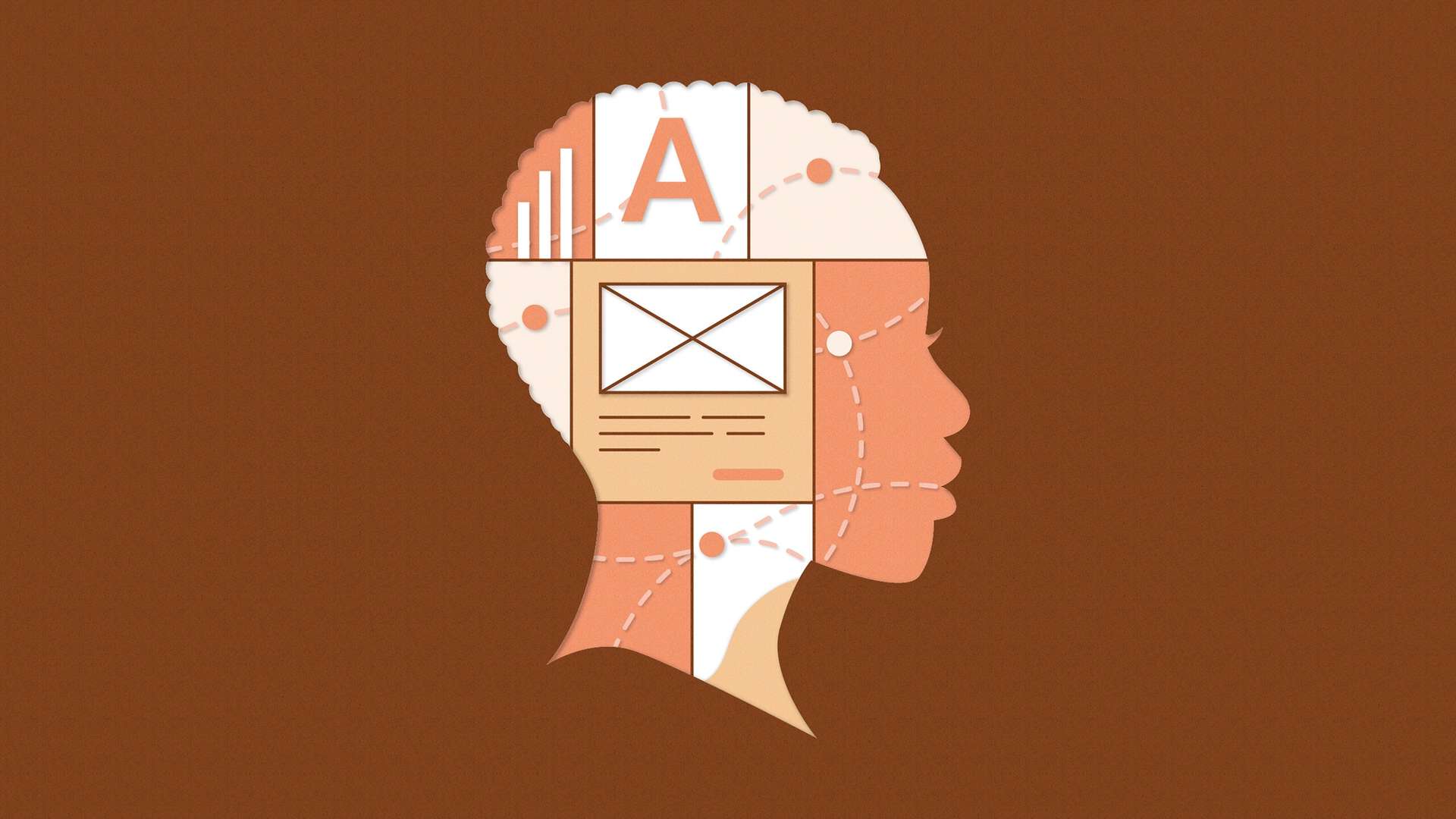While all user experience professionals work in service to the user, those who follow the UX research career path are the ones who really get into the nitty gritty with the people who use the product. Combining superpowers from behavioral and data sciences, UX researchers are proxies for the user. Their job is to listen deeply, observe without judgment, and translate what they learn into the findings our content, design, and developer teams rely on to do their work. When product teams design with data in mind, it’s the UX researchers who capture, frame, and deliver the data that drives an informed user experience design process.
Qualitative UX researchers recruit users, observe them using our products, and listen with empathy as participants describe their needs, wants, and problems. This research often uncovers useful patterns and insights that are shared with our collaborative product teams. Soft skills can help a lot in this work, too. Quantitative UX researchers often augment these practices with technical skills like creating surveys and analyzing behavioral data and user-generated content to estimate the scope of these patterns.
People from all backgrounds find themselves in research roles and love it. Whether you’re already on a UX research career path, looking to get into UX research, or wondering if your mix of skills might be a good fit, read on. You’ll learn how seasoned members of Indeed’s research team found their careers, what skills matter most on the job, what they love about their work, and what they wish they knew when they were starting out. These are their personal experiences, so please keep in mind that your experience may be different and there’s no guarantee that this advice will get you a job.
UX research careers are tech jobs for people without a tech background
UX research is a place in the tech world where people with degrees in the humanities, social sciences, and technology can all thrive. Our UX researchers have backgrounds in philosophy, psychology, computer science, and anthropology. It turns out that UX research can also be a haven for former academics.
Here some of our researchers share how they acquired their research skills.
Joe McCarthy, Lead Quantitative UX Researcher: I’ve picked up relevant skills from a lot of sources, including my undergraduate philosophy studies and computer science courses in graduate school. My experiences as a teacher helped hone my presentation skills.
Dr. Donna Maria Romeo, Senior UX Researcher: My Ph.D. in applied anthropology taught me how to ask the right questions, listen, empathize, and use a wide range of qualitative research methods. Once I started working for my first corporation, I learned how to truncate research timelines, simplify methods, write for an entirely different audience, and effectively communicate and influence across functions. At every new job, I learned more tools, ways of doing things, and perspectives.
Sara Koay, Senior UX Researcher: Most helpful was my degree in psychology, learning on the job, and mentorship from more senior people. Not quite as impactful but still helpful are my degree in human-computer interaction, the small library of research references I keep at home, being part of a research and UX community, going to training and conferences, and subscribing to UX blogs on Medium.
Kayla Farrell, Senior UX Researcher: I started my career with a UX design boot camp. It was recommended by a friend who was a UX designer and saw my interest in design, my academic background in psychology, and my general affinity for understanding humans. Boot camp helped me learn the tools used in the industry and translate my vocabulary and skillset from academia and lab research to a UX vocabulary. I was relentless in reaching out to UX professionals on LinkedIn and networking at UX meetups and events. I talked to many highly skilled, highly experienced UXers across functions about their day-to-day experience and got recommendations on how to learn more.
Research is where imagination meets critical analysis
A UX research career offers an opportunity to do both creative and analytical work. As with all good design, storytelling skills are foundational for many reasons. But research demands a deeper understanding of why people do the things they do. That’s where creating surveys and conducting interviews come in. When people with these talents start doing UX research, their skills click with the unique mix of creativity and strategy the role calls for.
Valle Hansen, UX Director: I chose UX research by accident. I was looking to get out of publishing, and I started investigating library schools because I thought that would be a natural adjacent step. I became aware of this discipline called UX and read more about it. Design has never been my calling, but research seemed like something I would love. And I do. It merges my undergrad degree in anthropology with my writing and storytelling skills from publishing.
Joe McCarthy: I have long been interested in the ways that people connect technologies and technologies connect people. I chose UX research at Indeed after a data scientist role because I felt I had strengths for the quantitative UX researcher position, and it worked out. This has been the best job I’ve ever had in terms of my ability to do the work, the impact of that work, and the appreciation my company and my collaborators show for the work I do.
Mary Gribbons, UX Director: UX research combines creative, analytical, and strategic strengths. I went to business school, so the strategy aspect really spoke to me. On top of that, I consider myself empathetic, a quality that lends itself to this job.
Sara Koay: As I explored career options after graduation, I found myself drawn to the energy and kindness of the UX community. Lots of folks in UX are so welcoming and helpful.
Kayla Farrell: When I first heard about UX, I was still deciding which path to pursue in academia within psychology and neuroscience specialty programs. UX research sounded enticing because it’s a more fast-paced, collaborative environment with quicker feedback loops to keep research honest. When insights from the research are incorrect or misguided, there is immediate feedback from users and usage.
Your soft skills will shine in a UX research career
Yes, a good UX researcher needs to master testing and research methods, have strong analytical skills, and keep the long-term picture in mind. But over and over, our researchers will tell you the foundation starts with your connections with people. Beyond user interviews and feedback, quality UX research means fostering internal relationships and building trust to get buy-in from stakeholders.
Mary Gribbons: Curiosity and empathy always go a long way in UXR. Plus, soft skills like holding a thoughtful conversation, prodding to get more information, and asking informed questions are essential tools of the trade. Also, don’t forget to show off storytelling techniques and your ability to think strategically. I didn’t realize early on that storytelling was one of the most necessary skills. I wish I dove into that earlier on in my career.
—
Is this article helpful? Subscribe to get occasional emails with new stories like it.
—
Valle Hansen: Empathy for users is key (obviously), but don’t forget your stakeholders. Having empathy for teammates feeds effective collaboration. So much of UXR is about earning your stakeholders’ trust so you can use that influence to be the voice of the user. That all starts with empathy.
Flexibility is important, too. Things change all the time—priorities, deadlines, availability of budget, stakeholders themselves, products—I could go on. Staying nimble helps you meet the needs and goals of your team and yourself.
Dr. Donna Maria Romeo: Work on empathy, listening, and childlike thinking: Try not to make assumptions. These are critical skills. Once you know how to think about problems, ask the right questions, care for others, and really listen, everything else builds upon this foundation.
Sara Koay: More skills have emerged for me over time, like adaptability. Team and project needs change. There isn’t one way to be a UX researcher. Because the most significant value in your research is what your team can understand and take away from it, learning to communicate your work effectively is essential.
Have lots of questions? You’re on the right track
No one starts a UX research career knowing it all. Even senior team members have room for improvement and get nervous about parts of the job. But that feeling of not knowing drives UX researchers to learn and do better for users. Learning how to leverage that attitude can help you further down the road.
Valle Hansen: There are textbook ways to do things in UXR, and there are practical ways to do things. I wish that academia taught the practical ways, but I understand why that’s often not possible. Sometimes, you have to say yes now to get your stakeholders on board later. It’s another part of building trust.
Joe McCarthy: As you establish your UX research career, be clear about what counts as impact in any job. I’ve had a few jobs where I misunderstood what counts as impact, and those jobs did not turn out well. Those miscommunications only increased my resolve to clarify impact definitions in future jobs.
Sara Koay: Enjoy yourself, and be present in the learning phase as much as possible. As you gain experience, your work velocity can increase, and it can feel like there’s less time to spend on learning.
Kayla Farrell: Sometimes our research doesn’t cover a question the team has after the study, or sometimes we can’t answer some questions at all. I wish I’d learned to get comfortable with this fact earlier in my career.
I also still get nervous before presenting and conducting moderated interviews. Often, when I admit to colleagues that I’m terrified of public speaking, they don’t believe me because I do a lot of presenting and have presented in large public-facing events before. I’m a ball of nerves inside, but colleagues comment that I seem confident while presenting. It might be helpful to know many researchers struggle with similar feelings, regardless of tenure or role.
Dr. Donna Maria Romeo: When an opportunity presents itself, keep your mind open to it—even if the job might take you along a slightly different path than you originally planned.
The people you meet will motivate you in new ways
What do UX researchers like most about their jobs? Not surprisingly, it’s the people. Getting deep into what makes users tick is why researchers get into this work in the first place. Researchers thrive on asking lots of questions, hearing unexpected answers, and sharing actionable insights with the broader UX teams.
Mary Gribbons: I get to meet so many new people, learn about their lives, and think about ways we can help make their lives easier.
Sara Koay: Even after six years, interacting with users is still my favorite part of the job. It’s always fascinating to glimpse into someone else’s world. You really can learn something from everyone.
Kayla Farrell: I enjoy sharing learnings the most, whether presenting research insights or sharing skills. I love when my audience is eager to hear about a particular topic or user feedback, especially when teammates throw questions my way that demonstrate curiosity and interest. These moments push me to think about the research content and my thought process.
You might not love every moment of a UX research career
Our researchers love what they do, but the work still takes a toll. Working closely with so many types of people can sometimes mean hearing tough things. It’s also a one-way relationship that requires researchers to listen without being heard. They take on others’ needs, and sometimes lose track of their own.
Mary Gribbons: Being on calls can be draining. I’ve learned a lot about protecting my energy, even as an extrovert.
Joe McCarthy: Everyone wants to do the right thing by users, but user experiences can’t always be directly tied to business metrics. No matter the size of your organization, teams sometimes have to make difficult choices between achieving metrics or fixing broken experiences.
Sara Koay: Managing time zones takes some flexibility. It’s exciting to conduct research across borders and understand the needs of varied cultures, but my working hours are not a typical nine-to-five.
Kayla Farrell: At larger companies, keeping track of everyone’s projects and ensuring I can connect the dots is a big undertaking. It can also be a blessing because it forces me to seek answers and talk to more people.
Valle Hansen: The job can take an emotional toll on you. Study participants will disclose hard-to-hear information, offer triggering comments, or inspire compassion fatigue. It’s important to take care of yourself by having a set decompression time after each session, restricting the number of sessions you do in a day, and having a trusted mentor with whom you can debrief.
Your jump into a UX research career begins with research
There’s a lot to learn about the day-to-day role of a UX researcher. And you’ll find all sorts of tools, services, products, and subject areas you can specialize in. People on our teams recommend you start by learning what opportunities are out there. Are you more interested in storytelling or numbers? Qualitative and quantitative research are both rigorous, but not all UX research jobs are for every person interested in research.
Remember, keep the basics in mind as you consider whether UXR is right for you: Read, ask questions, and don’t get discouraged.
Kayla Farrell: Consider reading books outside of research methodologies to expand your research mindset. Lots of what you’ll do as a researcher requires a curious mindset, which isn’t always in the tactical skill books. Some of the books on my shelf include, “Scout Mindset” by Julia Galef, “Liminal Thinking” by Dave Gray, “Mindset” by Carol Dweck, and “Thinking in Systems” by Donella H. Meadows.
Dr. Donna Maria Romeo: Conduct informational interviews before considering a job to better understand the corporate culture, work-life balance, and pay expectations. These are really, really important aspects to consider when taking any job.
Sara Koay: When you first look for jobs, don’t be disheartened if you aren’t hearing back from employers quickly. Landing that first UX job takes time. Be as prepared as you can with your CV, portfolio, and interview practice. Keep asking for feedback, and persevere.





